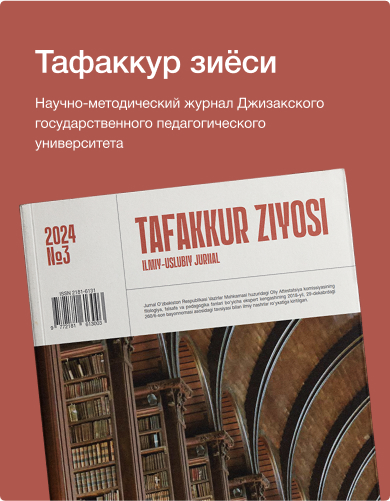Mamarasulova Iroda
Jizzakh state pedagogical university
Annotation: The learning of vocabulary is an important part in foreign language learning. The meanings of new words are very frequently emphasized, whether in books or in verbal communication. Vocabulary is a basic of one learns a foreign language. Through this article, the writer summarizes the related research that focus on the importance of vocabulary and explains many techniques used by some English teachers and lecturers when teaching English, as well as writer’s personal view of the issues.
Keywords: perspective, teaching of vocabulary, vocabulary.
As foreign language for Indonesian, learning English is like constructing a traditional building. A good engineer, a well-drawn blueprint, tends to be made for constructors to follow. It can be compared to a good language learner who is inclined to make plans and sticks to them afterwards. Similarly, steel can be compared to grammar which seems to most English Foreign Language (EFL) learners a monotonous and boring eyesore, given the fact that most EFL learners feel, more or less, worried when faced with grammar. However, it is generally accepted that EFL learners cannot have a good command of English without an in-depth sense of the structure of English. As far as mastering a foreign language is concerned, none of the language properties is to be ignored. If one asks what have been done to develop students’ knowledge in English, some educators may come out with the teaching approach which is then indicated by the academic achievement that measured through a very high frequency word measurement as per the need of social context.
Improving vocabulary skill among English language learners (ELLs) is a challenge faced by many universities. Several problems and limitations have been associated with the factors contribute to the level. This area has been a loop for some time. Some researchers for example, do not have good information of students’ success on vocabulary learning and other language skill where vocabulary is needed. Some even do not have information about the student’s individual language strengths and weaknesses. Vocabulary acquisition plays an important role in mastering a language. A learner with insufficient vocabulary size will not perform well in every aspect of language itself. Many college students still encountered difficulties in reading their English textbooks. The main reason for those college students who cannot read comprehensively is their limited vocabulary size. In order to facilitate the learning process for learners, a deep understanding of vocabulary teaching is rudimentary. In addition, some issues pertinent to the improvement in learners’ vocabulary size are also mentioned. Issues such as what to teach, and how to teach, is also submitted and discussed. Vocabulary Learning Vocabulary skill is often considered as a critical aspect of foreign language learners as limited vocabulary in a second language, impedes successful communication. Language use leads to an increase in vocabulary knowledge. The importance of vocabulary is demonstrated daily in and out of campuses. In classroom, the achieving students possess the most sufficient vocabulary. Researchers have realized that the acquisition of vocabulary is essential for successful foreign language use and plays an important role in the formation of complete spoken and written texts. Furthermore, argued that the acquisition of an adequate vocabulary is essential for successful foreign language use because without an extensive vocabulary, a language learner will be unable to use the structures and functions we may have learned for comprehensible communication. Some research has shown that second language readers rely heavily on vocabulary knowledge and the lack of that knowledge is the main and the largest obstacle for readers to overcome. This remark may possibly reflect that the open-endedness of a vocabulary system is perceived to be a cause of difficulty by learners. From the above explanation, it can be concluded, language teachers and applied linguists now generally recognize the importance of vocabulary learning and are exploring ways of promoting it more effectively.
Nowadays many readers, vocabulary books and course books contain a vast number of attractive pictures that present the meaning of basic words. The teacher can use learning materials provided by the school. They can also make their own visual aids or used pictures from magazines. Visual support helps learners understand the meaning and helps to make the word more memorable. It can be used to present meaning. In other words, this technique helps when any word is difficult to explain visually. We can say “clothes” and explain this by enumerating or listing various items. Teacher may list a number of clothes e.g. address, a skirt, trousers etc ,and then the meaning of the word “clothes” will became clear. Some words are easily explained to learners by contrasting it with its opposite, for instance, the word” good” contrasted with the word “bad”. But some words are not. It is almost impossible to contrast the words whose opposite is the gradable one. When the word “white” is contrasted with the word “red”, there is an “in between” word ”pink”. Furthermore, verb “contrast” means to show a difference, like photos that reveal how much weight someone lost by contrasting the “before” and “after” shots. Many more studies have also shown that vocabulary is best acquired if it is similar to what is already learnt. It is only when teachers dedicate their whole life to English can they achieve success in language learning, and students should be part of it.
REFERENCES
- The importance of vocabulary in language learning and how to be taught. International Journal of Teaching and Education, III(3), 2001, pp. 21 – 34.
- Berne, J. I. & Schmitt . What reading teachers say about vocabulary instruction: voices from the classroom. The Reading Teacher, 62 (4), 2003. pp. 314 – 323.
- Gruneberg & Sykes. Teaching languages to young learners. Cambridge: Cambridge University Press. 1996. 224 pp. 14-26
- Schmitt, N. Vocabulary in language teaching. Cambridge: Cambridge University Press.2000





